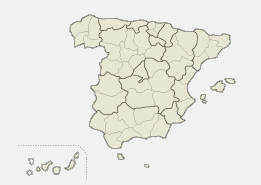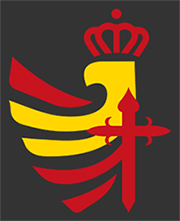Enemy at the gates

Destiny is not determined by clocks. Around 11.50, shots begin, and first sergeant González rushes to get his weapons.
During the trip, radio liaison with the 'Al Andalus' base in Najaf is permanent. They know a demonstration is expected to take place, since the previous day U.S. troops arrested Muqtada Al Sadr's second-in-command, imam Al Yaqubi. A big demonstration has taken place at the gates of the base, led by Al Yaqubi's wife.
Reports show that this morning, around eight, a new demonstration is scheduled. In anticipation that the main gate is crammed with protesters, they receive notice of using Baker gate to enter, so that is where they head. However, when they reach Najaf, they realise eveything is still, so they can use the main gate.

Eveybody knows what day it is today. It is the dawn of 4th April 2004. The day takes long to arrive, and the hours come and go hand in hand with all those they met at both sides of the 'Al Andalus' base in Najaf. All the sand in Iraq converged in front of its gates. When Cavalry arrives at the detachment, they are not surprised to see around forty Iraqi soldiers with antiriot equipment. At this point, it is calm outside, and the Iraqi antiriot soldiers rest under the scarce shade that still remains. 4/4/2004 is a hot day.
When the three VECs arrive, the squad is conducting reconnaissance of the area by helicopter. Lunch time has started at 11.30. It is 11.40 by Captain Placer's watch, chief of the squad. However, he decides to wait until the unit they must relieve is back, so they can have lunch all together.
Nevertheless, since destiny is not determined by clocks, around 11.50, shots begin to be heard. Initially, the intensity is very low. However, since the weapon never hinders a soldier, first sergeant Jorge González Vergara, rushes to the Corps of Guards to take his armament. Then, he goes to his bedroom, in the neighbouring premises, to quickly grab his helmet and bulletproof vest. A few metres away from the gate, a Spanish armoured is standing in surveillance position. The soldier holding the machine gun by the hatch warns him that a group of Iraqis are mass approaching, some of them wearing uniforms.
Without thinking it twice, since he knows it is not the hours, but the soul, that takes long to come, he approaches them quickly, with the HK ready, and the safety catch in the off position. He aims the gun at them and, in a deep voice, orders them to lie on the floor. They do instantly. One of the civilians raises his hand and shows him a card that is hung around his neck. With his face twisted, he tells him he is an interpreter. First sergeant Vergara does not allow them to stand up, and slowly but steadily, he clarifies the situation. Meanwhile, he looks around, trying to detect strange movements. He prefers to look harsh and firm in his gestures. They quickly identify themselves as Iraqi interpreters and soldiers who, ready to act as antiriot forces in the demonstration, when the shooting starts and, as they have no weapons with them, they opt for protecting themselves in the base. Nevertheless, Jorge asks them to remain in the same position until reinforcements arrive.

The intensity of the attack can no longer be concealed. Fire has become the owner of the border between Spanish soldiers and enemy attackers.
The intensity of the attack can no longer be concealed. Fire has become the owner of the border between Spanish soldiers and enemy attackers who aim at taking the base. These moments when reason and will travel alone, in the hands of permanent training in the combat, are starting. These two extremes never find virtue in a middle ground, but in the exaggeration of the effort.
As Captain Placer is waiting for orders, he decides that the whole unit occupy their positions in the VECs. Firearms and the whole scene that accompanies them surrounds the battle. Jorge, from the 16th promotion of the Basic General Academy, which was already in Bosnia back in 1994, knows that it is the moment to think just about the battle and endeavour to make his vehicle, weapons and men resemble the old centaurs, as the members of the Cavalry section that they are.
No soldier can imagine harm, sorrow or sadness until the combat is over. The main aim is to fight fiercely for fair causes. From the radio, Jorge's squad is commanded to reinforce the main gate, since the enemy is at the gates and plans to defeat the defence in the most vulnerable area. Both VECs rush through the designated area, one driven by Jorge and the other by first officer Molero. Jorge designates the firing sectors of each armoured. They are determined not to take a step back. There is no choice. They know they have no intention to retreat. If they do not manage to stop the enemies at this gate, it will be very difficult to prevent the base from being taken.

There is no other end but to make the enemy leave, as they have been looking for a major confrontation since the previous afternoon, even though they have been told by all means possible that the Spanish troops have nothing to do with Al Yaqubi's arrest, and that Moqtada Al Sader's deputy is not detained there.
Suddenly, Jorge spots a van approaching. A group of insurgents shooting their weapons get out of the vehicle. He immediately orders corporal Tomás, the shooter, to open fire with his 25mm caliber cannon. The vehicle explodes. The flames warn that the Cavalry section is at the gates, and that not even the gates of Thebes were so well defended.
For an outsider, the battle may seem chaotic. However, there is measure and movement in everything, and its changing course is nothing but the new firm credit treasured by a well-trained unit, serious as the harm may seem.
From Jorge's VEC, a lorry receives three precise shots that enter through the vehicle window, silencing the fire and avoiding danger.
When the VECs open fire for the first time, the characteristic sound of the shots from the M-242 25mm-cannon seems to silence the rest of the combat. With a perfect precision, it silences all the fire mouths and target assigned to the Cavalry squad. A lorry, which is being fired at its base, receives, from Jorge's VEC, three precise shots that enter through the vehicle window, silencing the fire and avoiding that danger.

They do not stop receiving enemy fire from the front and from the sides. A RPG rocket falls just a few metres away. Jorge thinks that this kind of weapons are the most dangerous ones. He knows well how harmful they can be, as he has seen his efficiency in the armoured. The weapons continue firing. Tension is mounting.
It is unbearably hot inside the vehicle. The passage of time is increasingly slow. Time must be pulled, since, between past and future, the present is lasting for too long. They have already been fighting for two hours, when they receive the colonel's order to use ammunition wisely, in case they become isolated by the enemy. However, they have been doing this since the beginning, as it is part of the instruction, the frequency of shots, target selection and fire discipline planning, depending on the diverse circumstances of the combat.

More than two hours have passed. When Jorge hears the noise of the helicopters, he knows that reinforcements are coming, so the combat's complexion will change. Until then, nobody had managed to cross the imaginary line that divides the main gate of the base. Now, with the support of the two Apache helicopters, four Defenders and three Black Hawk, with U.S. soldiers onboard, the base will not be taken by the enemy. They will have to stay at the gates.
Step by step, intensity of the fire is decreasing. Only some isolated bursts can be heard now. The VECs and their soldiers have resisted, without giving up a milimetre, their positions during the whole battle. Without eating, urinating in bottles, being careful not to dehydrate, since the Heraclitus river forgot to pass through that land. All its movement turned into motionless resistance, and its flow became desert sand.
It is said that there are two ways of becoming a hero: either doing what should be done, or doing what should not be done. First sergeant Jorge González Vergara's squad—including Tomás, Fidel, Pinar, Herrera, Molero, San José, Isidro, Soria and el Sevi— during the battle of Najaf, as they defended the 'Al Andalus' base with the enemy at the gates, did what should be done.
Interview to first sergeant Vergara
ARMY UNITS
- Araba Álava |
- Albacete |
- Alicante |
- Almería |
- Asturias |
- Ávila |
- Badajoz |
- Barcelona |
- Burgos |
- Cáceres |
- Cádiz |
- Cantabria |
- Castellón |
- Ceuta |
- Ciudad Real |
- Córdoba |
- A Coruña |
- Cuenca |
- Girona |
- Granada |
- Guadalajara |
- Gipuzkoa |
- Huelva |
- Huesca |
- Islas Baleares |
- Jaén |
- León |
- Lleida |
- Lugo |
- Madrid |
- Málaga |
- Melilla |
- Murcia |
- Navarra |
- Ourense |
- Palencia |
- Las Palmas |
- Pontevedra |
- La Rioja |
- Salamanca |
- Segovia |
- Sevilla |
- Soria |
- Tarragona |
- Santa Cruz de Tenerife |
- Teruel |
- Toledo |
- Valencia |
- Valladolid |
- Bizkaia |
- Zamora |
- Zaragoza



